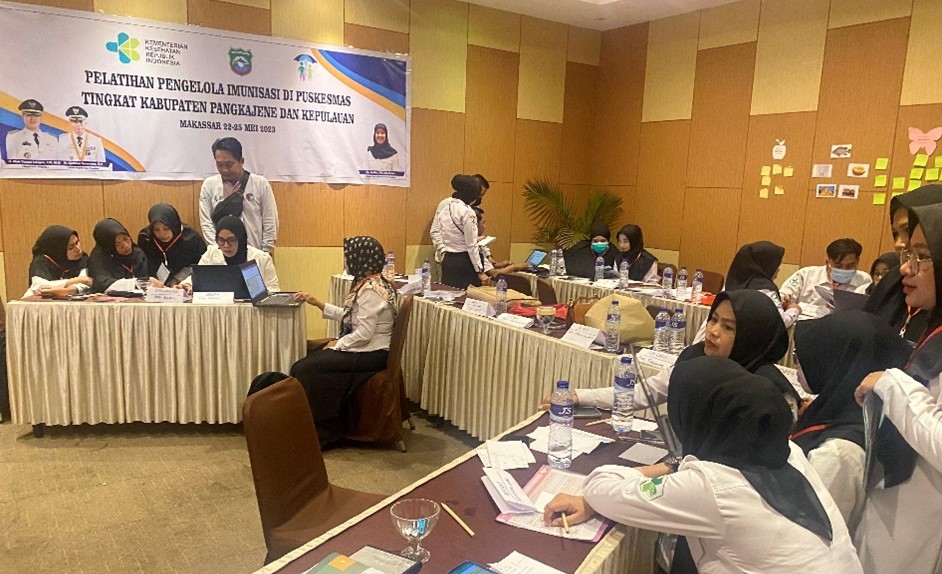With the national policy changes, it is important to update the knowledge and skills on immunization to effectively carry out the programme interventions. However, there is currently no updated nor standardized information, which hinders the programme’s efficacy. The inaccessibility of existing materials is compounding the problem. Hence, having a comprehensive set of materials will assist health workers in meeting their targets.
In 2022, the Ministry of Health (MoH), in collaboration with WHO, conducted an evaluation following the national immunization training of trainers held in the previous year. The participants expressed challenges at the time in providing in-class or on-the-job training in their respective provinces due to a lack of standardized job aids. This issue was also emphasized in the "Joint National/International EPI and VPD Surveillance Review". Subsequently, MoH sought WHO’s assistance to develop immunization job aids by involving experts and public health practitioners. The objective was to optimize the immunization workforce through up-to-date and succinct knowledge.

Healthcare workers training to utilize immunization job aids in Pangkep district, South Sulawesi (WHO/Yurniati)
As a follow-up, the Government of Indonesia, WHO, the Indonesian epidemiology association (PAEI), the national AEFI committee, CHAI, UNDP, UNICEF, and professional associations have successfully developed ten immunization job aids, available in both print and online formats. The topics were carefully selected, encompassing critical areas such as safe vaccination techniques for multiple injections, defaulter tracking, vaccine and logistics management, and microplanning. To ensure its effectiveness, the job aids underwent stages of drafting, field testing, finalization, and dissemination, entailing collaboration with various stakeholders and experts.
During the preparation and drafting stage, WHO Indonesia facilitated discussions to establish a shared understanding of the job aids’ goals and development process. Scoping the current situation from selected primary health care centres (Puskesmas) was conducted to provide insights of the current business processes for immunization. Based on the scoping and aligning with the national immunization programme, the topics were selected. Furthermore, WHO Indonesia collected job aids from global resources and samples from other countries to enrich the material.
Following the scoping, PAEI finalized the job aids material for field testing. The field testing encompassed several activities, such as virtual and in-person orientation for district health officed and puskesmas, virtual technical assistance, implementation, and evaluation. With support of WHO, the field testing occurred in Makassar and Bandung from February to March 2023. , Health workers expressed positive opinions, such as interactive design and easy-to-understand language, and constructive feedback, namely the topics’ order and the need for guidance and simulation. These feedbacks were meticulously considered to refine the clarity and comprehensibility of the content.
Consecutively, job aids were finalized and disseminated to five selected provinces: North Sumatera, Riau, West Java, East Java, and South Sulawesi. The MoH, WHO, and PAEI facilitated in-person meetings, which included role plays and guidance on accessing the online version at https://sites.google.com/view/panduanimunisasi/beranda. The effective implementation of job aids reflects the collaborative actions from key stakeholders that ultimately strengthen immunization outcomes and healthcare workers’ capabilities in Indonesia.

A facilitator conducts role play to provide a better understanding of how to use the immunization job aids a during health worker training in Indragiri Hilir district, Riau (credit: Tiara Noviandra/DHO Indragiri Hilir)
“I can easily learn from job aids because they are accessible at anytime and anywhere by using a link on my mobile phone. The design is attractive because it is equipped with pictures” (Ns Nur Sella,S.Kep, Immunization Officer in lndragiri Hilir Riau district, Riau)
“New immunization officers who have not been exposed to immunization can use the job aids as guidance” Maslan Wannahari, SST, Head of Section of Surveillance, and Immunization in Mandailing district, North Sumatera
Strengthening health workforce capacity is crucial in improving immunization outcomes. By utilizing the job aids, healthcare workers could enhance planning and service delivery which lead to reducing the number of zero-dose children. Improving immunization service quality is one of the benefits that increase caregiver satisfaction. Hence, job aids are crucial tools for successful vaccination programmes, safeguarding communities and vulnerable populations.
WHO Indonesia’s immunization programme is supported by the Australian government through the Department of Foreign Affairs and Trade (DFAT).
Written by Olivi Ondchintia Putilala Silalahi, NPO Routine Immunization
